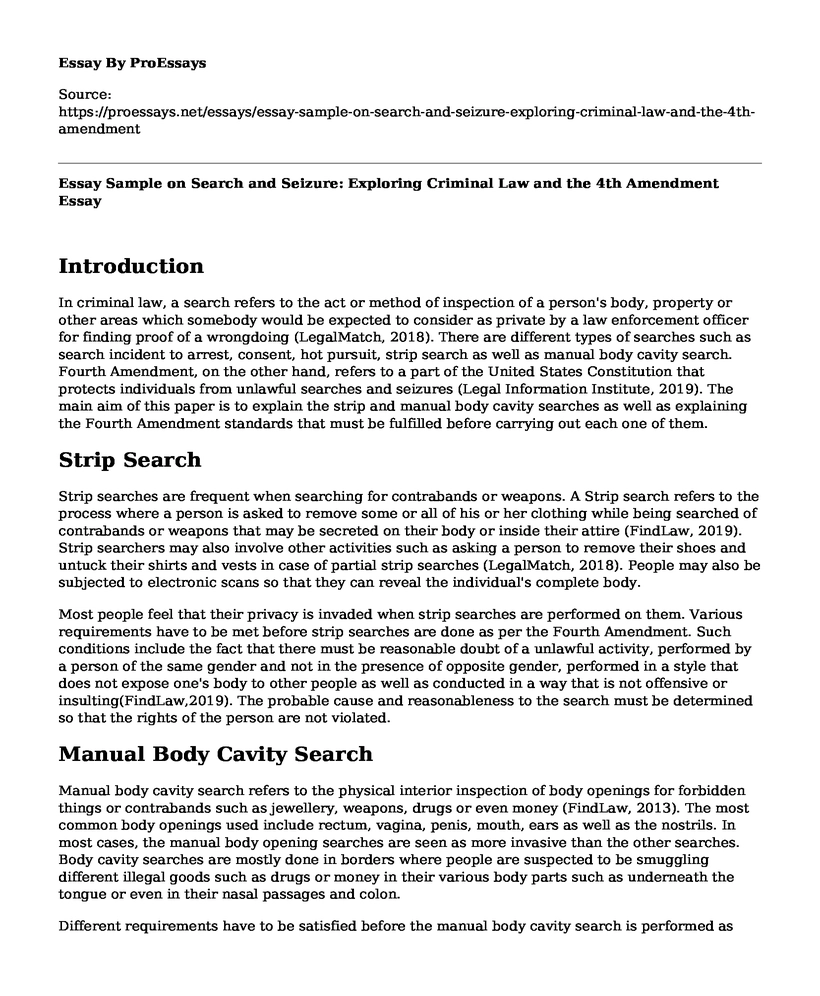Introduction
In criminal law, a search refers to the act or method of inspection of a person's body, property or other areas which somebody would be expected to consider as private by a law enforcement officer for finding proof of a wrongdoing (LegalMatch, 2018). There are different types of searches such as search incident to arrest, consent, hot pursuit, strip search as well as manual body cavity search. Fourth Amendment, on the other hand, refers to a part of the United States Constitution that protects individuals from unlawful searches and seizures (Legal Information Institute, 2019). The main aim of this paper is to explain the strip and manual body cavity searches as well as explaining the Fourth Amendment standards that must be fulfilled before carrying out each one of them.
Strip Search
Strip searches are frequent when searching for contrabands or weapons. A Strip search refers to the process where a person is asked to remove some or all of his or her clothing while being searched of contrabands or weapons that may be secreted on their body or inside their attire (FindLaw, 2019). Strip searchers may also involve other activities such as asking a person to remove their shoes and untuck their shirts and vests in case of partial strip searches (LegalMatch, 2018). People may also be subjected to electronic scans so that they can reveal the individual's complete body.
Most people feel that their privacy is invaded when strip searches are performed on them. Various requirements have to be met before strip searches are done as per the Fourth Amendment. Such conditions include the fact that there must be reasonable doubt of a unlawful activity, performed by a person of the same gender and not in the presence of opposite gender, performed in a style that does not expose one's body to other people as well as conducted in a way that is not offensive or insulting(FindLaw,2019). The probable cause and reasonableness to the search must be determined so that the rights of the person are not violated.
Manual Body Cavity Search
Manual body cavity search refers to the physical interior inspection of body openings for forbidden things or contrabands such as jewellery, weapons, drugs or even money (FindLaw, 2013). The most common body openings used include rectum, vagina, penis, mouth, ears as well as the nostrils. In most cases, the manual body opening searches are seen as more invasive than the other searches. Body cavity searches are mostly done in borders where people are suspected to be smuggling different illegal goods such as drugs or money in their various body parts such as underneath the tongue or even in their nasal passages and colon.
Different requirements have to be satisfied before the manual body cavity search is performed as indicated by the Fourth Amendment. The police officers are required to have a search warrant so that they can conduct the search. The search warrant, in most cases, looks at the reasonableness of invading a suspect's body as well as the states interest in obtaining evidence of a crime. Therefore, body cavity searches should not be performed if there is a less invasive method that can be used to find the evidence needed, even if it is in good faith (FindLaw, 2013). Despite the regulations of the Fourth Amendment three are special occasions where the police still perform body cavity searches without search warrants. This includes at the border, airport or upon incarceration.
References
FindLaw. (2013, November 7). When Can Police Conduct a Body Cavity Search? Retrieved from https://blogs.findlaw.com/blotter/2013/11/when-can-police-conduct-a-body-cavity-search.html
FindLaw. (2019). Strip Search after an Arrest. Retrieved from https://criminal.findlaw.com/criminal-rights/strip-search-after-an-arrest.html
Legal Information Institute. (2019). Fourth Amendment. Retrieved from https://www.law.cornell.edu/wex/fourth_amendment
LegalMatch. (2018, April 10). Strip Search Laws. Retrieved from https://www.legalmatch.com/law-library/article/strip-search-laws.html
Cite this page
Essay Sample on Search and Seizure: Exploring Criminal Law and the 4th Amendment. (2023, Mar 26). Retrieved from https://proessays.net/essays/essay-sample-on-search-and-seizure-exploring-criminal-law-and-the-4th-amendment
If you are the original author of this essay and no longer wish to have it published on the ProEssays website, please click below to request its removal:
- Abduction Definition, Prevalence, and Types
- Paper Example on Security Issues in a Casino
- Dr. Mann's Statements on the Racist System of the USA Criminal Justice System
- Historical Development of Capital Punishment and Religion Essay
- Community Armed Self-Defense Essay Example
- Research Paper on Youth Crime Prevention: Rethinking Justice Intervention
- Essay Example on the Harsh Childhood of H.H. Holmes, America's First Serial Killer







